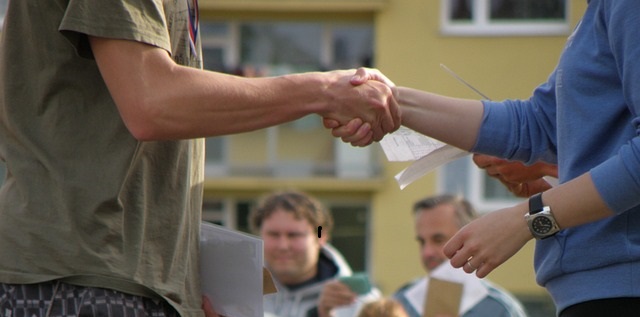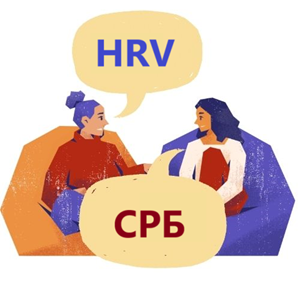Introducing yourself and your family
Learn: name, surname, age, family members, verbs „to be“ and „to have“
CROATIAN VERSION
Transcription – CRO
Zovem se Tamara. Moje ime je Tamara, a prezime Novaković, ali svi me zovu Tami. To je moj nadimak.
Imam 24 (dvadeset četiri) godine, uskoro 25 (dvadeset pet) godina. Imam veliku obitelj. Imam mamu, tatu, brata, sestru, baku i djeda.
Moja mama ima 50 (pedeset) godina, a moj tata ima 53 (pedeset tri) godine. Moj brat je stariji od mene, a sestra je mlađa od mene. Brat ima 31 (trideset i jednu) godinu, a sestra ima 17 (sedamnaest) godina.
Baka i deda imaju 66 (šezdeset šest) godina. Mama, tata, brat i ja imamo posao – mi radimo, a sestra ide u školu. Baka i dida su u mirovini / u penziji.
Također imam prijatelje. Moj najbolji prijatelj se zove Marko, a moja najbolja prijateljica se zove Klara.
VOCABULARY
- zovem se – my name is
- ime – name
- prezime – surname
- nadimak – nickname
- velik – big
- obitelj – family
- stariji – older
- mlađi – younger
- posao – job; work
- raditi – to work; to do
- škola – school
- mirovina/penzija – retirement
- također – also
- imati – to have
- prijatelj (m) / prijateljica (f) – friend
- najbolji / -a – the best
SERBIAN VERSION
Transcription – SRB
Cyrillic
Зовем се Тамара. Моје име је Тамара, а презиме Новаковић, али сви ме зову Тами. То је мој надимак.
Имам 24 (двадесет четири) године, ускоро 25 (двадесет пет) година. Имам велику породицу. Имам мајку, оца, брата, сестру, баку и деду.
Моја мама има 50 (педесет) година, а мој тата 53 (педесет три) године. Мој брат је старији од мене, а сестра млађа од мене. Брат има 31 (тридесет једну) годину, а сестра 17 (седамнаест) година.
Бака и деда имају 66 (шездесет шест) година. Мама, тата, брат и ја имамо посао – радимо, а сестра иде у школу. Бака и деда су у пензији.
Имам и другаре. Мој најбољи друг се зове Марко, а моја најбоља другарица се зове Клара.
Latin
Zovem se Tamara. Moje ime je Tamara, a prezime Novaković, ali svi me zovu Tami. To je moj nadimak.
Imam 24 (dvadeset četiri) godine, uskoro 25 (dvadeset pet) godina. Imam veliku porodicu. Imam majku, oca, brata, sestru, baku i dedu.
Moja mama ima 50 (pedeset) godina, a moj tata 53 (pedeset tri) godine. Moj brat je stariji od mene, a sestra mlađa od mene. Brat ima 31 (trideset jednu) godinu, a sestra 17 (sedamnaest) godina.
Baka i deda imaju 66 (šezdeset šest) godina. Mama, tata, brat i ja imamo posao – radimo, a sestra ide u školu. Baka i deda su u penziji.
Imam i drugare. Moj najbolji drug se zove Marko, a moja najbolja drugarica Klara.
VOCABULARY
- зовем се / zovem se – my name is
- име / ime – name
- презиме / prezime – surname
- надимак / nadimak – nickname
- велик / velik – big
- породица / porodica – family
- старији / stariji – older
- млађи / mlađi – younger
- посао / posao – job; work
- радити / raditi – to work; to do
- школа / škola – school
- пензија / penzija – retirement
- такође / takođe – also
- имати / imati – to have
- друг / (m) / другарица / (f) – friend
- најбољи / najbolji / -a – the best
Translation
Zovem se Tamara. Moje ime je Tamara, a prezime Novaković, ali svi me zovu Tami. My name is Tamara. My name is Tamara, and surname Novaković, but everybody calls me Tami.
To je moj nadimak. Imam 24 (dvadeset četiri) godine, uskoro 25 (dvadeset pet) godina.
That’s my nickname. I am 24 years old, soon to be 25.
Imam veliku obitelj/porodicu. Imam majku, oca, brata, sestru, baku i djeda/dedu.
I have a big family. I have a mother, father, brother, sister, grandmother and grandfather.
Moja mama ima 50 (pedeset) godina, a moj tata 53 (pedeset tri) godine.
My mom is 50 years old and my dad is 53 years old.
Moj brat je stariji od mene, a sestra mlađa od mene.
My brother is older than me and my sister is younger than me.
Brat ima 31 (trideset jednu) godinu, a sestra 17 (sedamnaest) godina.
My brother is 31 years old, and my sister is 17 years old.
Baka i deda imaju 66 (šezdeset šest) godina.
Grandparents are 66 years old.
Mama, tata, brat i ja imamo posao – radimo, a sestra ide u školu.
Mom, dad, brother and I have jobs – we work, and my sister goes to school.
Baka i deda su u mirovini/penziji.
Grandma and grandpa are retired.
Imam i prijatelje/drugare. Moj najbolji prijatelj/drug se zove Marko, a moja najbolja prijateljica/drugarica Klara.
I also have friends. My best friend’s (male) name is Marko, and my best friend’s (female) name is Klara.
Analysis
How to introduce yourself in Croatian & Serbian?
Just as Tamara did – with the verb “zvati se”.
The verb “zvati” means “to call” and you can use it when talking about calling someone, on the phone, for example. But if you include the pronoun “se”, you can use it to say “My name is”. The pronoun “se” means myself so the literal translation would be “I call myself Tamara”. But, of course, it’s just a phrase used to introduce yourself.

Kako se zoveš? – What’s your name? Or literally “How do you call yourself?”
You see, the pronoun “se” can mean myself, yourself, herself, himself… remember this pronoun because it often appears as a part of some verbs.
Another way to say “Zovem se” is “Moje ime je” – literally my name is.
How old are you? – Koliko imaš godina?
In Serbo-Croatian, we use the verb to have – imati – to speak about age. Literally, I have 24 years – Imam 24 godine.
The year is godina and it changes depending on the number after which it comes:
If the last digit is 1 – Imam 1 (jednu), 21 (dvadeset jednu), 31 (trideset jednu)… godinu.
If the last difits are 2, 3, 4 – Imam dvije CRO/dve SRB godine (as well as 22 – dvadeset dvije/dve godine, 32 – trideset dvije/dve godine, 43 – četrdeset tri godine)
All after 5 – Imam 5 (pet) godina, 25 (dvadeset pet) godina, 49 (četrdeset devet godina), 60 (šezdeset) godina…
VERBS
IMATI is a regular verb. We can use it to see how to make present tense in Croatian & Serbian:
- Remove – ti from infinitive (imati – ima-ti)
- Add certain suffixes. For first person singular (ja) it’s always -m → imam. Let’s see the rest of the conjugation:
| gram.person | verb – IMATI | Example from the text |
|---|---|---|
| ja (I) | imam | Imam 24 godine. |
| ti (you) | imaš | |
| on, ona, ono (he, she, it) | ima | Moja mama ima 50 godina. |
| mi (we) | imamo | Mama, tata, brat i ja imamo posao. |
| vi (you all) | imate | |
| oni, one (they) they male, they female | imaju |
The same is with other regular verbs, for example, RADITI (to do, to work, to make):
Mama, tata, brat i ja imamo posao – mi radimo.
But some verbs are irregular, such as IĆI (to go):
| gram.person | verb – RADITI | *verb- IĆI |
|---|---|---|
| ja | radim | idem |
| ti | radiš | ideš |
| on, ona, ono | radi | ide (Sestra ide u školu.) |
| mi | radimo | idemo |
| vi | radite | idete |
| oni, one | rade* | idu* |
**Also, you can see that 3rd person plural (oni, one) is different. It depends on the verb type (-iti group (like: raditi), -ati group (imati) -ći group (ići) or -jeti group which we will introduce in the next story.
Also, you could notice that we don’t use pronouns – ja, ti, on, ona,ono, mi, vi, oni, one – in the sentences if it’s not needed to emphasize something.
Just say the verb: instead of ja imam, it’s more natural to say only – imam. It’s clear that it’s first person singular (ja) because of the suffix -m which is used only for “ja”. The same is with other grammatical persons.
Introduce the first Croatian & Serbian grammatical case – AKUZATIV
With the verb IMATI, a direct object always comes into the sentence. What is it?
Example:
Ja imam sestru.
ja – subject in the sentence
imam – verb
sestra – direct object, the object of the verb, in this case, the object of having
In Serbo-Croatian, the direct object is always in AKUZATIV, which means that you need to modify the word a little bit by changing or adding the suffix. Which suffix you will add? It depends on the gender of the noun. Let’s introduce 3 GENDERS IN SERBO-CROATIAN language:
MASCULINE
Masculine words are not only the words that refer to male people in reality but also any word that ends with a consonant (vocals are a, e, i, o, u; all other letters are consonants)
For example: ormar (wardrobe, closet), mobitel (mobile phone), televizor (TV)… all these are objects, things but we talk about them as “he” – on, and not “it” – ono.
These words get one kind of suffix in AKUZATIV form:
–suffix “-a” if the word refers to people or animals (alive beings):
Imam brata.
– and no suffix if it’s about inanimate:
Imam televizor.
FEMININE
All the words that end with -a are considered feminine.
They change the last “a” for “u” in akuzativ:
Imam sestru.
NEUTRAL
These words end with -o or -e.
Examples: mlijeko CRO/mleko SRB (milk), dijete CRO/dete SRB (child)
In akuzativ, they stay the same as in the basic form (the basic form is called nominativ).
That’s why the family members: mama, tata, sestra, brat, baka, djed in the sentence sound like:
Imam mamu, tatu, brata, sestru, baku i djeda.
Exceptions
Note that tata is an exception in masculine gender: in reality, tata is a man (dad) but grammatically it’s feminine because it ends with -a so it’s declined as feminine, meaning it gets suffix -u in akuzativ. (Imam tatu.)
The same is for dida/deda and the Serbian word for a male neighbour – komšija.
VARIATIONS IN VOCABULARY
The names for grandfather are various. In Dalmatia, Croatian region, and on the Croatian coast formal djed is changed to dida. In other parts of Croatia as well as in Serbia, people use deda. In Serbia, people also use the word deka.

The name for grandmother also differs. In some regions, people say baka and in other regions baba. It’s interesting that in the same time, baba is used for a woman who irritates you.
Moreover, words for a friend are different. In Croatia, prijatelj is used only for male friends and prijateljica for female friends. (There are always two forms for somebody: doktor-doktorica, frizer- frizerka (hairstyler) and so on)
In Serbia, there are prijatelj, drug and drugar – prijateljica, drugarka, drugarica.
In Bosnia, it’s mostly used jaran – jaranica but other variations are also familiar to Bosnian people.

